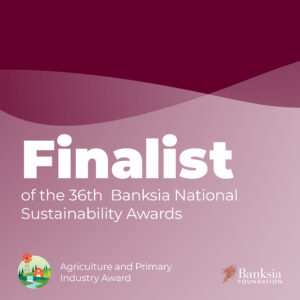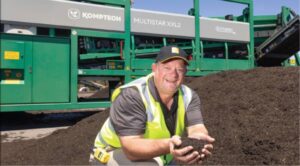Jess testing in the onsite laboratory
Composting is one of the most important processes in nature as it converts dead material into food for the living. We see this in the bush where trees die and are subsequently broken down and eventually enter the soil to be taken up as nutrients by the next generation of grasses, shrubs and trees. There are many organisms involved such as wood rotting fungi, earthworms and bacteria. Water and oxygen also play a critical role.
Many home gardens are committed to composting their own wastes such as lawn clippings, shrub and tree pruning and vegetable scraps from the kitchen. This is a very positive move that I believe, needs to be fostered at every level.
Composting has a significant role to play at a community level where there are two major benefits; the diversion of organic wastes from landfill and the production of composted product to add fertility to the impoverished sandy soils found here in WA.
Successful composting at this industrial level is of critical importance to society to ensure that we don’t lose vital resources on which food production will increasingly come to depend.
So how does composting work when we are dealing with large scale operations? The first point to make is that not all composts are the same. There are similarities with baking a cake, all the ingredients can be found in the pantry. You select different ingredients to make a chocolate cake to a fruit cake or a sponge. Each cake has its own recipe and is cooked for a specific time. Each type of cake appeals to a different person.
I see composting as a mix of art and science. To show you what I mean I am going to follow two scientists who work at C-Wise, the Mandurah based composting company, to monitor, tweak and control the process.
Jonathan Abaquin trained and worked in the Philippines as a chemical engineer who has been working with C-Wise for 5 years. His background includes the development and production of organic fertilisers, both solid and liquid. He is responsible for monitoring the processes on the hard stand areas of the facility, literally where the compost is made. This includes taking readings of oxygen and temperature levels as well as water content. He uses a range of testing equipment some high tech and a few are low tech, such as hand and nose.
When he plunges his hand into a working compost he can quickly get a feel for how far along the process the mix is. For instance if it’s too hot to keep his hand in for more than a few seconds, then temperatures are likely to be over 70 degrees C. This would indicate active composting in the early stages.
Jonathan will also grab a handful of composting material and have a sniff. What does this tell him? “A mature compost”, he said, “has a nutty natural smell with nothing unpleasant to curl up the edge of your nose”. On the other hand, vinegar odours indicate that the mix is in an anaerobic condition, caused by breakdown in the absence of oxygen. Like a winemaker Jonathan has a finely tuned sense of smell, which enables him to pinpoint the exact stage of the composting process that a mix has reached.
Measuring the water content of the working compost by the squeeze test is Jonathan’s speciality. As part of the ongoing training for all the employees at the facility, regular ‘feel’ tests are run. The competition is on to determine the percentage of moisture of a number of composted products using this hand test. A dry weight test undertaken in the lab is the gold standard by which everyone is judged. Jonathan is so accurate often within one percentage point that the other members of the team are lobbying to have him disqualified from entering the competition.
He also monitors the large ponds of water to ensure treatment is proceeding according to plan. The process is similar to composting with oxygen being the main driver. Waste water, including grease trap waste, storm water and wash down water from farms is taken into the system. After filtering the waste liquid is treated in a series of ponds to where air is mixed in to oxidise the chemical and biological materials to de-contaminate the water. Jonathan samples the oxygen level in the ponds as well as the amount of suspended material. Once treated, most of this water is recycled back into the composting process.
Samples of various composts and water resources are prepared by Jonathan and taken to the on-site laboratory where another scientist, Jess Bell takes charge of these and does all the testing that follows. Jess is a graduate of UWA and as Technical and Quality Coordinator she also is responsible for managing the ISO9001 accredited management system. This is designed to measure and compare against set standards, every process in the production system. The goal is to ensure consistency and reliability of the output of the facility, in particular, Jess manages final product quality.
C-Wise have a range of certified organic soil improvers, turf top dressings and mulches. In order to maintain accreditations for these products Jess conducts internal audits and assists the external auditors from Australia Certified Organics when they visit the facility.
These days compost producers such as C-Wise need to operate within strict requirements set by the Department of Environment Regulation, Department of Water and the Shire of Murray to ensure compliance with licence conditions. Jess also looks after all this compliance work for the company.
Jess is passionate about improving soil health as well as organic and sustainable farming. She has recently purchased a hobby farm which is in the throws of being turned into a horse heaven for her four legged children. In addition, it is planned to be a demonstration plot to show how to make fantastic and powerful growing soil so that she can eat the best and freshest food available on the planet.

Squeeze test for moisture content

Jonathan testing water quality in storage dam

The sniff test





